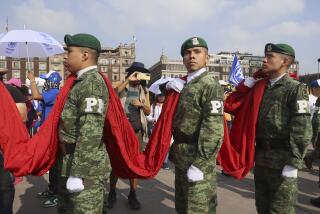Mexican Rebel Leader Marcos Attends Forum Unarmed
- Share via
MEXICO CITY — The mercurial leader of the simmering Indian revolt in Mexico’s southernmost state of Chiapas took a dramatic step toward the peaceful resolution of that conflict Monday, appearing in public unarmed for the first time in nearly two years.
He attended a forum on the rights of indigenous Mexicans. The decision by the rebel leader, who calls himself Subcommander Marcos, to lay down his assault rifle and pistol for 48 hours and leave his jungle hide-out near the Guatemalan border was more symbolism than substance. But it added weight to recent declarations by his Zapatista National Liberation Army that the group is transforming itself from an armed rebel force into a political movement to push a national agenda for reform.
Federal legislator Jaime Martinez, a delegate at the forum in San Cristobal de las Casas--the city where the Zapatistas launched their armed revolt on New Year’s Day 1994--called Marcos’ presence “a dazzling show that gives us real hope of building peace.”
Another key member of Mexico’s Chamber of Deputies, legislator Adolfo Aguilar Zinser, said: “Marcos is consolidating politically. It is an important step. . . . He is trying to take a political stance without a real military capitulation or defeat.”
“This is an act of peaceful will and a gesture that will contribute to a solution to the problems of the country,” concluded San Cristobal’s Roman Catholic Bishop Samuel Ruiz, a key mediator in continuing peace talks between the Zapatistas and the government.
For most of the delegates at the conference, the rebel commander’s ski-masked, pipe-smoking presence spoke for itself. Marcos has not left his jungle hide-out unarmed since soon after a massive Mexican military operation left at least 145 dead before both sides declared unilateral cease-fires a few weeks after the rebellion began.
Nearly a year ago, President Ernesto Zedillo verbally unmasked Marcos on national television, identifying him as a leftist university professor named Rafael Sebastian Guillen Vicente. Zedillo also issued arrest warrants for him and four other Zapatista leaders.
The warrants were later canceled to facilitate the peace talks, which will formally resume Wednesday in the Chiapas town of San Andres Larrainzar. But Marcos had previously refused to leave his Lacandon jungle hide-out, asserting he was afraid the large contingent of Mexican army troops still deployed in the region would kill him.
Through the months of tedious negotiations with Zedillo’s representatives, though, the Zapatistas’ negotiating line appears to have softened gradually, culminating in the group’s second-anniversary statement issued last week. The lengthy communique announced that the Zapatista movement was entering “a new stage.”
“The Zapatista National Liberation Army is not disappearing, but its most important force is moving into the political struggle,” the statement declared. “The [rebel army] will participate directly in the formation of the Zapatista National Liberation Front,” which it described as a nonviolent political force that will act within the national constitution.
Marcos was not scheduled to speak at Monday’s forum, where there were calls for constitutional amendments that would give more land rights and civil freedoms to the estimated 7 million people in Mexico’s many Indian communities. He delivered a short prepared speech when he arrived in San Cristobal on Sunday evening, after traveling four hours from the jungle through villages where church bells rang and crowds cheered, in a 10-car convoy with a Mexican Red Cross escort.
More to Read
Sign up for Essential California
The most important California stories and recommendations in your inbox every morning.
You may occasionally receive promotional content from the Los Angeles Times.













